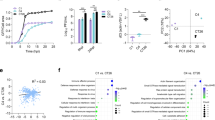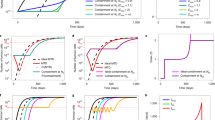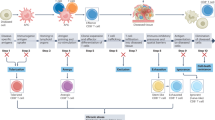Abstract
KLEIN1,2 has found that the so-called Ehrlich ascites tumours of mice offer several advantages over solid tumours for studying the effect of a substance on the growth-rate, on nucleic acid content and on the cytomorphology of neoplastic cells. These advantages have been applied lately by a number of investigators3,4 to studies dealing with the effect of viral infection upon the neoplastic process and with the adaptation of virus to the ascitic cells5. These investigations have all been carried out in the peritoneal cavity of the mouse. An in vitro technique which may prove feasible for similar studies, particularly host-cell virus studies in neoplastic cells cultivated apart from the animal, was recently developed in our laboratory.
This is a preview of subscription content, access via your institution
Access options
Subscribe to this journal
Receive 51 print issues and online access
$199.00 per year
only $3.90 per issue
Buy this article
- Purchase on SpringerLink
- Instant access to the full article PDF.
USD 39.95
Prices may be subject to local taxes which are calculated during checkout
Similar content being viewed by others
References
Klein, G., Cancer, 3, 1052 (1950).
Klein, G., Exp. Cell Res., 2, 518 (1951).
Koprowska, I., and Koprowski, H., Fed. Proc., 11, 420 (1952).
Love, R., and Koprowski, H., Fed. Proc., 11, 421 (1952).
Ackermann, W. W., and Kurtz, H., Proc. Soc. Exp. Biol. and Med., 81, 421 (1952).
Jacobson, W., and Webb, M., Exp. Cell Res., 3, 163 (1952).
Hull, R. M., Science, 117, 223 (1953).
Dietrich, A., and Schutzinger, L., Z. Krebs., 56, 121 (1948).
Weiss, P., “Principles of Development” (Henry Holt and Co., New York, 1939).
Author information
Authors and Affiliations
Rights and permissions
About this article
Cite this article
SIEGEL, B. In Vitro Cultivation of Mouse Ascites Tumour Cells for Virus–Host Cell Studies. Nature 173, 584 (1954). https://doi.org/10.1038/173584a0
Issue date:
DOI: https://doi.org/10.1038/173584a0



